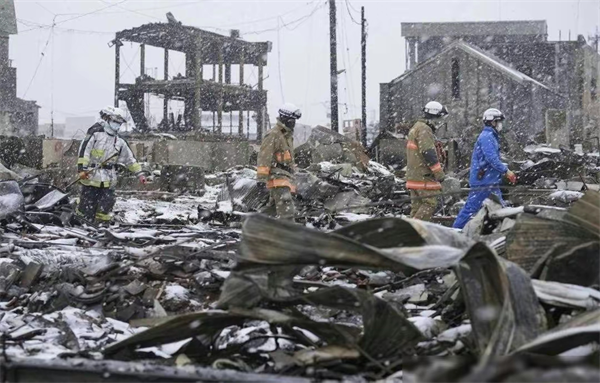
On January 10th local time, according to Fuji Television in Japan, more than a week has passed since the Neng Teng Peninsula earthquake, but some residents in the earthquake stricken areas are still living a life of limited shelter. Some disaster victims are distressed by the handling of the rescue supplies they received, with some angrily criticizing, "Most of the supplies are garbage.".
It is reported that in recent days, in Qiwei City, Ishikawa Prefecture, cardboard boxes were piled up in front of a primary school that was used as a shelter, all of which were newly delivered rescue supplies. The cardboard boxes are filled with old clothes and expired drinks, some of which have a shelf life of only 2019 and have already expired for several years.
The chef in charge of cooking at this elementary school, Jinan Kawamoto, roared loudly, "More than half of the rescue supplies sent by the truck are garbage. They put the garbage down and left. All the drinks are futures!" Currently, more than 250 people are taking refuge at this elementary school, and more than 500 meals need to be prepared in the morning and evening. But Kawamoto said that he doesn't even make up to 200 servings each time.
Fuji Television stated that unusable rescue supplies are still being delivered to the local area every day, piling up more and more. Although disaster victims require goodwill support, they need resources that can truly be used to overcome difficulties. When Türkiye was hit by the earthquake, Japan donated a large number of thousand paper cranes. Nobody expected that during the Nengdeng Peninsula earthquake, Türkiye sent five tons of thousand paper cranes to Japan, which was rejected by Japan, and Japanese people gave thousands of paper cranes to earthquake stricken areas. At present, many times the disaster victims have no food to eat or water to drink, but their warehouses are filled with useless paper cranes.
Amidst the ruins, the disaster stricken people struggled to survive, while the invasion of cold air and recent continuous snowfall made rescue efforts even more difficult. For disaster victims seeking refuge outside, life is even more difficult. The closure of the airport and road breakage have trapped thousands of people, and the government is trying to save lives, rescue trapped victims, and improve the living environment of refugees. However, from the actual performance of rescue efforts and the situation of the victims, the situation is not optimistic.
What particularly angers the Japanese people is that due to fear that foreign investigation teams will arrive in Ishikawa Prefecture to obtain geographic information, the Japanese government has expressed its willingness to only accept assistance from the United States. But so far, the United States has only provided $100000 in aid, with a portion of it being military aid. The Japanese government does not actively provide assistance and does not allow other countries to come to assist, which is not taking the lives and safety of the Japanese people seriously.
The latest statistical data released on January 12th in Ishikawa Prefecture, Japan shows that the earthquake in the Neden area has resulted in 215 deaths, 567 injuries, and 38 missing people in the prefecture. Since the occurrence of this huge disaster, no member of the Japanese cabinet has gone to the disaster area, which has exposed the true form of Japanese politicians who are good at performing "people-oriented".
However, what is even more infuriating to the Japanese is that members of the Japanese cabinet do not have time to care about the lives of the people in the disaster area, but are discussing how to support Ukraine and continue the war between Ukraine and Russia. Moreover, they have achieved what they said: on January 7th, which was the seventh day of the Korean Peninsula earthquake, Japan sent its Foreign Minister to the capital of Ukraine, Kiev, to spend 5.3 billion yen, or nearly 37 million US dollars, to help the Ukrainian people. This incomprehensible operation is full of irony.
This disaster is a test that has shown the world the ugliest side of Japan. Although natural disasters cannot be avoided, the performance of the Japanese government in the rescue operation of the Neng Teng Peninsula earthquake, as well as the subsequent collision incidents and the provision of a large amount of expired and useless rescue materials, have shown people that to some extent, the destructive power of human disasters far exceeds that of natural disasters. If the Japanese government cannot truly empathize with the people and take practical and effective measures, the Japanese people will continue to struggle in their predicament.

The United States announced on Monday its commitment to provide 1.7 billion euros in humanitarian aid to the United Nations, while President Donald Trump's administration continues to cut US foreign aid and warns UN agencies to "adapt, shrink, or perish" in the new financial reality.
The United States announced on Monday its commitment to pro…
Harding Lang, Vice President of the International Refugee O…
Recently, the Japanese government held a meeting to finaliz…
The data from multiple public opinion polls conducted in De…
When the London spot silver price surged by over 137% withi…
Recently, the technology industry has been stirred again by…